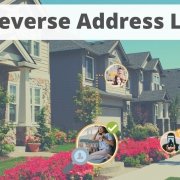How to Perform a Free Reverse Address Lookup with Searchbug
Looking for a Free Reverse Address Lookup? Whether you want to verify an address, confirm property details, or find out who owns a property, this guide walks you through the most effective free and paid options available today. Searchbug provides an easy-to-use tool that helps you access accurate information quickly—no subscriptions or hidden fees. You can confirm if an address is valid, discover possible residents, and identify linked contact details in just a few steps.
This guide explains what a reverse address lookup is, how it works, when free tools are enough, and when paid lookup services provide more complete results. By the end, you’ll know exactly how to perform a Free Reverse Address Lookup for personal or business needs.
What is a Reverse Address Lookup or Reverse Address Search?
A reverse address lookup starts with the street address and returns information linked to that location. Some people call this a reverse address search, reverse lookup address, or even reverse address look up, but they all describe the same process.
Depending on the source, results may include:
- Property ownership
- Current and past residents
- Phone numbers and emails tied to the address
- Business listings connected to the location
- Public filings related to the property
Free sources often confirm whether an address exists and how it’s formatted. Paid lookups can add people and contact details, plus recent changes. For projects that depend on accuracy—lead generation, real estate outreach, collections, or due diligence—having a reliable reverse address search process is a big help.
When to Use Free Tools vs. Paid Lookup Services
You have options:
-
Free address lookup methods help you confirm if an address is valid and may reveal business listings or older public data. They’re useful for quick checks, but the data can be limited or outdated.
-
Searchbug’s paid reverse address lookup combines public and proprietary data sources to return more complete results when free options don’t provide enough. You get details like names, known aliases, phone numbers with line type, relatives, and address history—often within seconds. Pricing is clear, and you’re not charged if nothing is found.
Why many users choose paid lookup tools when free methods fall short:
- Multiple verified sources (public and proprietary) instead of a single directory
- Fast results with practical details you can act on
- Transparent pricing per result; no forced subscriptions
- Nationwide coverage for residential and business addresses
- Upgrade paths for bulk work and deeper research when needed
If you only need to confirm that an address exists, start with free tools. If you need people and contact information tied to that address, a paid lookup is the straightforward path.
Step-by-Step Guide: How to Do a Reverse Address Lookup with Searchbug
Searchbug keeps the process simple and transparent from start to finish.
Step 1: Visit the SearchBug Lookup Page
Open the Reverse Address Lookup page on Searchbug. You’ll see clear fields for entering the address and guidance to format it properly.
Step 2: Enter the Full Address
Provide the complete street address, city, and state. The ZIP Code is optional but improves accuracy.
Important input rules:
- Include the house or building number.
- You cannot search by street name only to list everyone on a street.
- Add apartment, suite, or unit when applicable.
- Use USPS-style formatting to avoid mismatches.
Step 3: Review the Results
SearchBug queries multiple sources and returns what’s available. Results typically include:
- Complete name and any known aliases
- Present address plus a 3-year address history with reported dates
- All known phone numbers with line type (wireless or landline)
- Age and relatives (with ages)
- Email address, if available
Not all fields are available on every record. Availability depends on the underlying data for that location and person.
Step 4: Know Where the Data Comes From
Searchbug aggregates data from:
- Public records and voter registration
- Real estate filings and property records
- Phone books and vital records
- Magazine subscriptions
- Proprietary sources not included in basic free directories
This blended approach improves match rates and reduces dead ends.
Step 5: Understand the Cost
- $1.95 per search or 195 Search Tokens ($T)
- No charge if no information is found
- If you’ve never used Search Tokens, your first results are free
- New users also get 500 $T free with any Search Tokens purchase
Search Tokens are a simple way to pay per lookup without monthly contracts. If you handle occasional research, this keeps costs predictable.
Other Methods for a “Free Reverse Address Lookup”
These methods cost nothing and are helpful for basic validation and context. They don’t usually return the level of detail a paid lookup provides.
1) USPS Zip Code Lookup
Use the USPS ZIP Code Lookup to confirm that the address exists and is formatted correctly. It’s great for mail accuracy. Industry insights from Sepire, estimate that about 4% of U.S. mail is undeliverable each year due to incorrect or incomplete addresses, so verifying the format before sending is important. It will not show owner names or resident information.
2) Search Engines
Type the full address into a search bar for Google, Bing, Yahoo! or any other search engine. This works best for business locations. You may see a business profile, maps listing, or older directory pages. For private residences, results are hit-or-miss and often outdated.
Tips:
- Put the address in quotes for exact matches.
- Try variations (with/without “Suite,” “Ste,” or unit numbers).
3) Social Platforms and Review Sites
Search directly within Facebook, LinkedIn, Yelp, and Google Maps. Businesses often list addresses on profiles and review pages. Personal addresses rarely show up here, but business pages can be useful.
4) Free Online Directories
Sites like Whitepages and Yellowpages can show older listings. Treat them as context rather than a source of truth. They’re often incomplete and lag real-world changes.
Bottom line: Free methods are good for confirming an address and collecting clues. When you need names, contact details, and recent history, a paid lookup saves time.
5) Try a free online address lookup
Free online address lookup tools tend to be more reliable than internet searches in terms of finding some information. However, free online address lookups can’t guarantee the accuracy of the information they find.
Free address search tools rely mostly on information from the white pages and yellow pages. This information is publicly available. Most of it is used by police departments or published in libraries. That’s why information from these sources isn’t reliably found using a simple Google search.
However, as you may have guessed, free tools just don’t have the support to provide quality data. For a few cents (or less), you can get much better data from a paid search tool. For example, our Reverse Address Lookup Tool provides dependable reverse address lookups for less than a penny apiece.
When a Reverse Address Lookup Helps Most
Here are common situations where this work pays off:
- Homebuyers and renters
Validate an address, see basic history, and reduce surprises before you commit. - Real estate professionals
Identify who’s connected to a property and reach the right person faster. - Marketers and sales teams
Verify addresses before sending mail. Reduce returns and wasted spend. - Investigators, law firms, and compliance teams
Gather current residents, relatives, and historical addresses to support case work. - Small businesses and contractors
Confirm customer addresses before scheduling site visits or shipments. - Individuals
Check unknown addresses before visiting or mailing something important.
If the address is central to your outreach or decision, a reliable reverse address search saves follow-up work.
Options for Bulk and Advanced Lookup Work
If the free reverse address lookup methods don’t work for you, it may be time to invest a bit of money into your search.
- Batch Append
For businesses, this is more ideal. Upload TXT, CSV, or Excel to process hundreds or thousands of records. Choose the data you want added (name, phone, email). Useful for list building, data cleanup, and outreach prep. - Property Records Search
See ownership details, prior transfers, valuation, and related records for deeper context. - Reverse P.O Box Search Locate the forwarding address or physical address associated with the PO Box number hosted at a US Post Office.
- Hiring Private Investigator– If you need verified information beyond what automated tools can provide, hiring a private investigator is an option. Investigators often perform utility searches to determine who pays the bills at an address, helping uncover hard-to-find data. While more costly and time-consuming, this method is best for cases involving legal disputes, fraud investigations, or verifying property ownership details.
Frequently Asked Questions (FAQs)
Q1. How accurate is Searchbug’s Reverse Address Lookup?
Searchbug uses multiple verified providers and refreshes its data regularly, making it more reliable than free-only tools.
Q2. Can I look up any U.S. address?
Yes, the tool works nationwide for residential, business, and PO Box addresses.
Q3. Do I get property owner details with a free lookup?
Free tools confirm the address and format but may not provide owner details. Paid lookup services offer more comprehensive results.
Q4. What’s the difference between free and paid reverse address lookups?
Free tools give basic verification and older public data. Paid lookup services provide up-to-date ownership information, contact details, and deeper insights.
Q5. What’s the best free reverse address lookup option?
USPS, Google Maps, and county assessor databases are commonly used. Choose based on the level of detail you need.
Q6. Is reverse lookup address the same as reverse address lookup?
Yes. Reverse lookup address, reverse address search, and reverse address look up all refer to searching by street address to find related records.
Final Thoughts
A free reverse address lookup is a great starting point for confirming an address and collecting basic details using USPS, search engines, and online directories. These methods work well when you only need simple validation or business context.
If you need more complete information, such as ownership records, resident history, or linked contact details—free tools may have limitations. Choosing the right method depends on your goal, whether it’s for mailing accuracy, property research, or personal inquiries.
Taking a balanced approach ensures the data you gather is accurate, current, and reliable.
Start your Reverse Address Lookup with Searchbug today and get the information you need in seconds.













It makes a lot of sense that reverse address lookup is a great way to find potential business leads and contacts. I also like that you say the lookups usually work for single-family houses because the information is the most accurate and you won’t have to worry about apartments or suite numbers. It seems like reverse address lookup could be a great tool for sales and because my brother works in sales and has a new product coming out soon, I will make sure to share this information with him.
Hello Rosie,
Thanks for checking out our blog and for the feedback! Yeah, Searchbug’s Reverse Address Lookup Service is a great tool for people in sales. So is our Reverse Phone Lookup Tool that can provide your brother with phone numbers of potential clients. He can even run his list of customers through our Batch Append Service to verify client information he has and/or get verified email addresses and phone numbers for those leads in bulk instead of searching them one by one.
Let us know if we can help and we hope you guys enjoy the tools available.